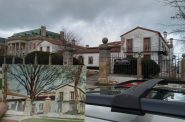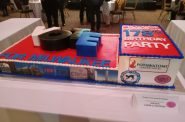Whose Scandal is it, Anyway?
“Legislator may profit from UWM project.” That was the headline in the Milwaukee Journal Sentinel for this article that appeared in the December 23rd, 2003 edition. The legislator, Rep. Curt Gielow (R-Mequon), was a limited partner and consultant to Prism Development Co., the firm chosen to redevelop the Kenilworth Building for UWM. Gielow became involved in the project while he was serving on the board of the UWM Foundation, (he was once president) yet before he ran for the assembly.
Prism was awarded the contract, but the award was later rescinded once the Doyle administration took office, in part due to publicity regarding Gielow’s involvement with the project. This seems to have been forgotten in the most recent spate of J/S articles about the Kenilworth, and bears examination.
Prism has since sued former Doyle Secretary of Administration Marc Marotta, saying he was inappropriately involved with the selection process that ultimately led to the choice of Weas Development for the 500,000 sq. ft. project, which is nearing completion on E. Kenilworth Pl., between N. Farwell and N. Prospect avenues. Weas was chosen in a second round, after the initial proposals were rejected.
The Prism suit is now in the headlines of the paper, which has apparently completely forgotten that this scandal was inherited by the Doyle administration from its predecessor Republican administration of Scott McCallum.
If anything, the Prism contract award was by far the scandalous event, although no prosecution took place.
Now, we have the Democratic Attorney General, Peggy A. Lautenschlager, informing the public that her office is investigating Doyle, her predecessor, for the contract award.
One person key to the events is Jim Plaisted, the executive director of the East Side Business Improvement District #20.
His recollections are deposition-worthy, and show a much different picture of the negotiations for the project than appear in the newspaper. The BID was created in 1998; Plaisted has been involved in the project from the beginning. As early in 1999, the master plan for the neighborhood identified the Kenilworth Building (formerly a Ford Motor Company plant) as a catalyst for the redevelopment of the area.
Plaisted served on a committee in 2000 to discuss the redevelopment of the property. In line with his responsibilities to the neighborhood, Plaisted sought community input and involvement in the project.
“The RFP was poorly drafted, bureaucratic in nature and offered no review role for the neighborhoods involved or the City of Milwaukee for that matter. … Several responders mentioned how poorly the RFP was constructed, and only two offered serious proposals: Prism Development and Cullen/Scion,” Plaisted says.
Plaisted says he offered to alert the bidders to his concerns during the review process, but was told by UWM officials that there “was no room for negotiating the details of their proposal before the State awarded the development contract to Prism.”
[In fact, it has since been documented that Prism officials indeed were able to make their own revisions to the proposal during the State review. This is significant, since changes during State review was a significant factor in the controversy involving the State travel contract awarded to Adelman Travel.]
Plaisted says there were problems with both proposals, since each included student housing levels of over 400 units, an amount that would be unacceptable to the neighborhoods in the vicinity.
Plaisted, with his BID, the Water Tower Landmark Trust and city officials, then contacted the state legislators for the area, Rep. Jon Richards and Sen. Jeff Plale, and expressed their concerns that the development was “dead in the water if it comes before the community as proposed, and that the process was flawed from the beginning by not taking into account neighborhood and City perspectives.” Not to mention the Gielow / Prism connection.
Plaisted then attended a meeting in Richards’ office with Marotta, UWM officials, Plale, and Alderman Michael S. D’Amato.
The state officials and UWM then agreed to advise the State Building Commission to reissue the RFP, thus angering the Prism officials, who had assumed the contract would be theirs. “I’m assuming the community concerns were the straw that broke the camel’s back,” Plaisted says.
The project was rebid in 2003, this time with community input, and the result is the Weas project, which seems destined to receive many awards when it opens later this year. Weas, Plaisted says, was open to working with the neighborhood groups. The process, he says, “was conducted in an above-board manner with community stakeholders at the table.”
As far as Marotta’s involvement, which is the subject of Prism’s politically-motivated suit, Plaisted says, “I don’t recall one instance [during the process] where anyone in the room mentioned talking to Secretary Marotta or having to consult with him. The only time I ever talked to him was in the meeting in Rep. Richard’s office.”
“What is interesting to note from my perspective and in light of Spivak & Bice’s premise [expressed in their columns about the Prism v. Marotta lawsuit] is that the very flawed and secretive first RFP process was started by the Republican administration of Scott McCallum and awarded to a future Republican lawmaker. It doesn’t appear that this first RFP is up for the same scrutiny from Spivak & Bice. Why?”
This article was originally published by Milwaukee World.
Plenty of Horne
-
Villa Terrace Will Host 100 Events For 100th Anniversary, Charts Vision For Future
 Apr 6th, 2024 by Michael Horne
Apr 6th, 2024 by Michael Horne
-
Notables Attend City Birthday Party
 Jan 27th, 2024 by Michael Horne
Jan 27th, 2024 by Michael Horne
-
Will There Be a City Attorney Race?
 Nov 21st, 2023 by Michael Horne
Nov 21st, 2023 by Michael Horne




















